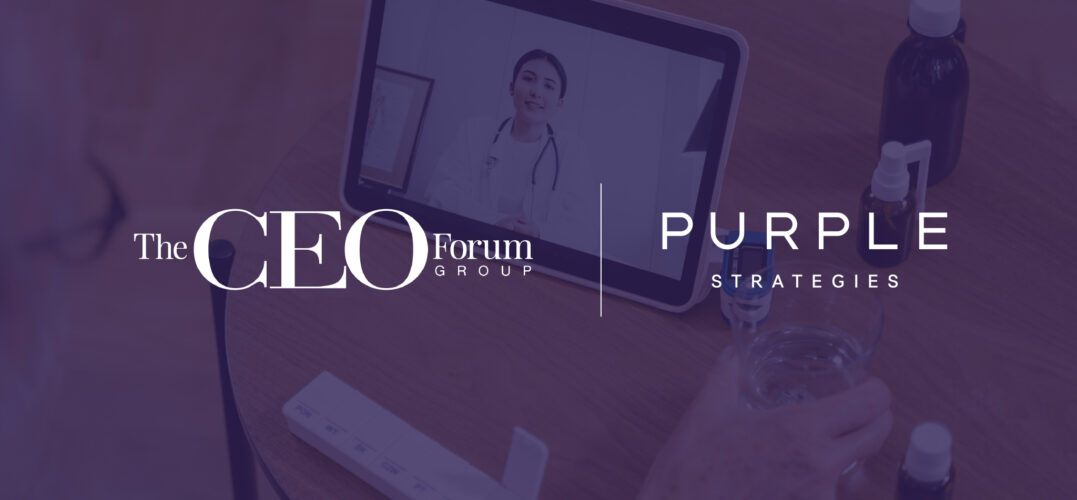Purple Strategies is the thought leadership partner of The CEO Forum Group and Transformative CEO Summit series, featuring CEOs of leading companies discussing creative ways to solve today’s most pressing challenges. The Transformative CEO Summit on Healthcare brought together CEOs in the industry to explore future models of healthcare, the role of leadership, culture and supply chain agility in healthcare transformation, and the impact of AI.
As the old year gave way to the new, healthcare executives gathered for the third annual Transformative CEO Summit on health to discuss some of the most pressing challenges in the space. Here are four topics that are on the minds of healthcare CEOs as 2024 begins.
(1) AI’s rapid advancement is changing the face of healthcare for both patients and medical professionals.
While AI has been in use in healthcare for decades, industry leaders at December’s Summit – including healthcare practitioners, administrators, and partners who serve this industry – expect these technologies to expand exponentially in the coming years on a range of applications – from reducing doctors’ research time and administrative work and addressing staff burnout, to advancements in behavioral health and improved disease diagnoses and treatment recommendations. Notwithstanding their concerns about setting proper boundaries for AI in healthcare (more on this below), experts believe that AI’s integration into healthcare operations will continue to revolutionize healthcare, leading to improved efficiency, better patient care, and significant progress in addressing critical health issues.

(2) The future of healthcare will revolve around personalized care and a deeper integration of AI in home-based services.
Leaders see healthcare moving toward virtual and home-based services, a major democratizing shift that is patient-driven and that will increasingly rely on technology for support and advancement. The goal is to make healthcare more inclusive, customized, and responsive. In addition to developing and embracing the technologies to support this transition, the move toward virtual/home-based healthcare will also require building capability and agility in the supply chain of healthcare products and services.

(3) AI should augment, not replace, the human element in healthcare.
Noting the broader fears some people have over AI’s potential to displace human-driven work and processes, industry leaders stress that effective integration of AI in the healthcare space should prioritize augmenting human involvement, not substituting it entirely. Human oversight of AI-driven processes will be necessary to maintain accuracy, transparency, and accountability where human judgment and decision making are required – particularly around as yet unresolved privacy and security concerns. The experts discussed that as this technology is rapidly developed and as those in this field race to deploy these technologies, there is an imperative for leaders to reflect on the applications and limitations of using technology in this space, especially as regulation struggles to keep pace.

(4) The greater focus on preventive care stems from a shift in healthcare paradigms toward proactive and patient-centric approaches.

The future of health will continue the shift in focus from sick care to well care. Experts at the Summit discussed the degree to which preventive care is often more cost-effective for all involved – by focusing on early detection and intervention, healthcare systems can potentially reduce the financial burden associated with treating chronic illnesses in later stages. Beyond the financial benefit, early identification and management of health issues contribute to better patient outcomes, often helping avoid the progression of diseases and resulting in improved quality of life and increased lifespan. The integration of technologies like AI allows for more personalized and predictive healthcare including the ability to analyze health data, identify risk factors, and enable timely interventions. A preventive care model also aligns with a patient-centered approach, focusing on individual wellbeing and empowering individuals to actively participate in their health.

Explore more from Purple Strategies in the Transformative CEO Summit series:

 Strike on Corporate Reputation
Strike on Corporate Reputation  Global Insights Leader Jeremy Ruch Joins Purple Strategies
Global Insights Leader Jeremy Ruch Joins Purple Strategies  Turning a Corporate Risk into a Brand Opportunity
Turning a Corporate Risk into a Brand Opportunity  What RFK Jr. and MAHA Means for Your Business
What RFK Jr. and MAHA Means for Your Business